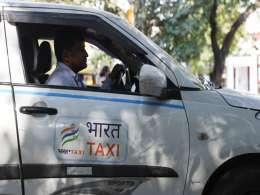British Prime Minister Theresa May, only the second woman to hold this position since Margaret Thatcher, is in India on a two day visit. May is the first PM to visit India since her country voted to leave the European Union in June this year. But why is she here and how has her visit been going? Here’s all that you wanted to know.
The one word that brings her here is: investment. This is May’s first bilateral visit outside of the EU, as PM. Post Brexit Britain wants to renegotiate its trade and investment deals with the rest of the world, even before the process for exiting from the EU is formally triggered. In fact, for several years now, Britain has been vying for India investment and defence deals. It was hoping that India will choose the Eurofighter Typhoon for a much publicised and long drawn out deal to augment the Indian Air Force’s (IAF’s) ageing and depleting fleet of battle-worthy fighter jets, but India chose the French Rafale instead. There is now talk that Eurofighter could renew its bid, since the IAF has chosen to go in for just 36 jets instead of 126 for which the tender was placed, although this will be easier said than done. India too wants UK companies to invest in its fledgling defence sector. In fact, eyeing India’s potential as a trade partner post Brexit, May is offering India a liberalised visa regime. Possibly the first ever scheme of this sort for Indian businessmen, it will come with easier transits via UK airports and access to the EU.
What are the other areas on which the two countries have agreed?
The two countries have exchanged pacts on intellectual property and the ease of doing business. Indian Prime Minister Narendra Modi said that the two countries have formed a joint working group on trade. Besides business, May and Modi also talked about terrorism and security cooperation
But is all well between India and UK on the business front?
Not really. All diplomatic niceties aside, Modi seems to have done some hard talking with May over her country’s immigration rules. Modi asked the UK to let more Indian students study in that country’s universities, some of which are ranked among the best in the world. “Education is vital for our students and will define our engagement in a shared future,†Bloomberg cited him as saying. “We must therefore encourage greater mobility and participation of young people in education and research opportunities.†Even as the then UK’s home minister May had a policy of requiring students from countries like India to return home after their respective courses ended, which led to the number of Indian students signing up for UK universities dwindle by half.
“We have a visa system for countries outside the European Union which ensures that the brightest and the best are able to come to the United Kingdom,†the same Bloomberg report cited May as saying, while talking to reporters travelling with her. “The figures show that we issued more work visas to India than, I think, the US, Australia, Canada and China put together.â€
Another report however did cite her as saying that she may be willing to relax the visa system if India agrees to take back ‘tens of thousands of overstayers.’ “...the UK will consider further improvements to our visa offer if at the same time we can step up the speed and volume of returns of Indians with no right to remain in the UK,†The Telegraph cited her as saying. “And the UK will continue to welcome the brightest and best Indian students, with the latest figures showing that nine out of ten applications are granted.†As of March 2015, India was the highest recipient of UK visas, with Indians getting nearly 86,000 visas to visit the UK.
Is May meeting Tata Steel officials during her visit?
No. News reports say that she has been unable to secure a meeting with officials at Tata Steel, which, under former chairman Cyrus Mistry, had put its UK assets on the block following losses after a slump in steel prices and cheaper imports from China. Reuters said in a report on Sunday that May will not meet Tata Steel executives, even as talks about the loss-making steel major’s future ownership are still on. In March, Tata Steel had put its UK assets up for sale, and at least 11,000 steel workers face an uncertain future. This comes amid a raging public controversy after the Tata Group sacked Mistry as the chairman of the board of its holding company Tata Sons. The Group’s interim chairman Ratan Tata is reportedly conducting a detailed review of Tata Steel UK, before taking a final call on whether to retain or sell it. Tata is likely to decide on the matter in four weeks. The Guardian newspaper said in a report that Tata is keen on retaining the UK assets.
Like this report? Sign up for our daily newsletter to get our top reports.






